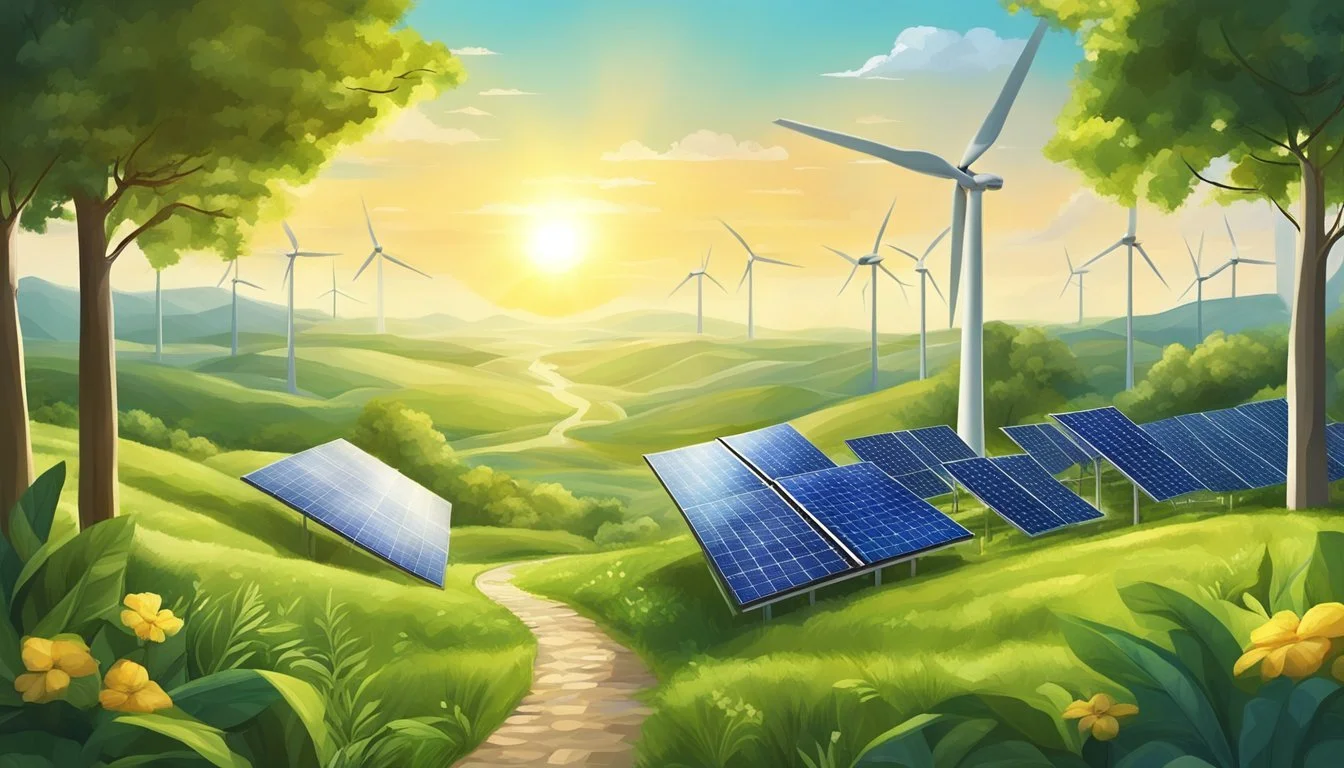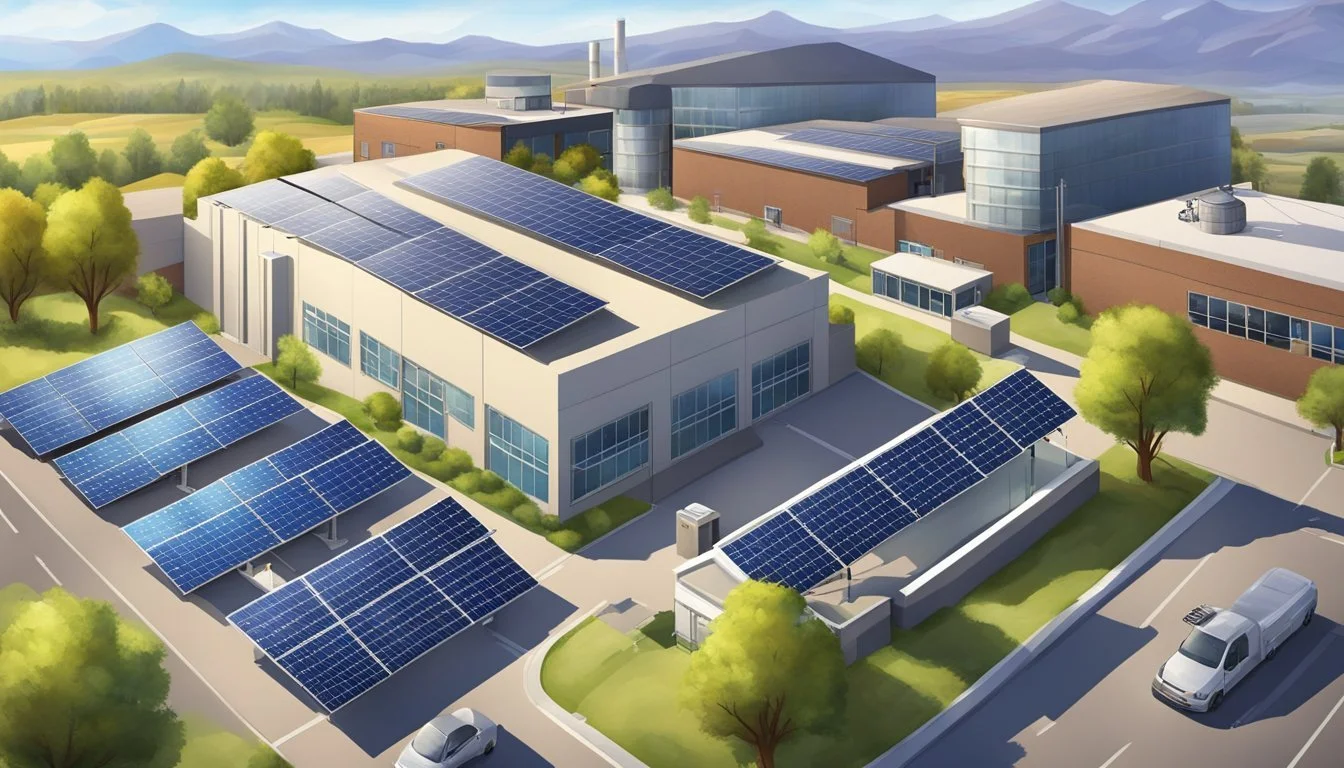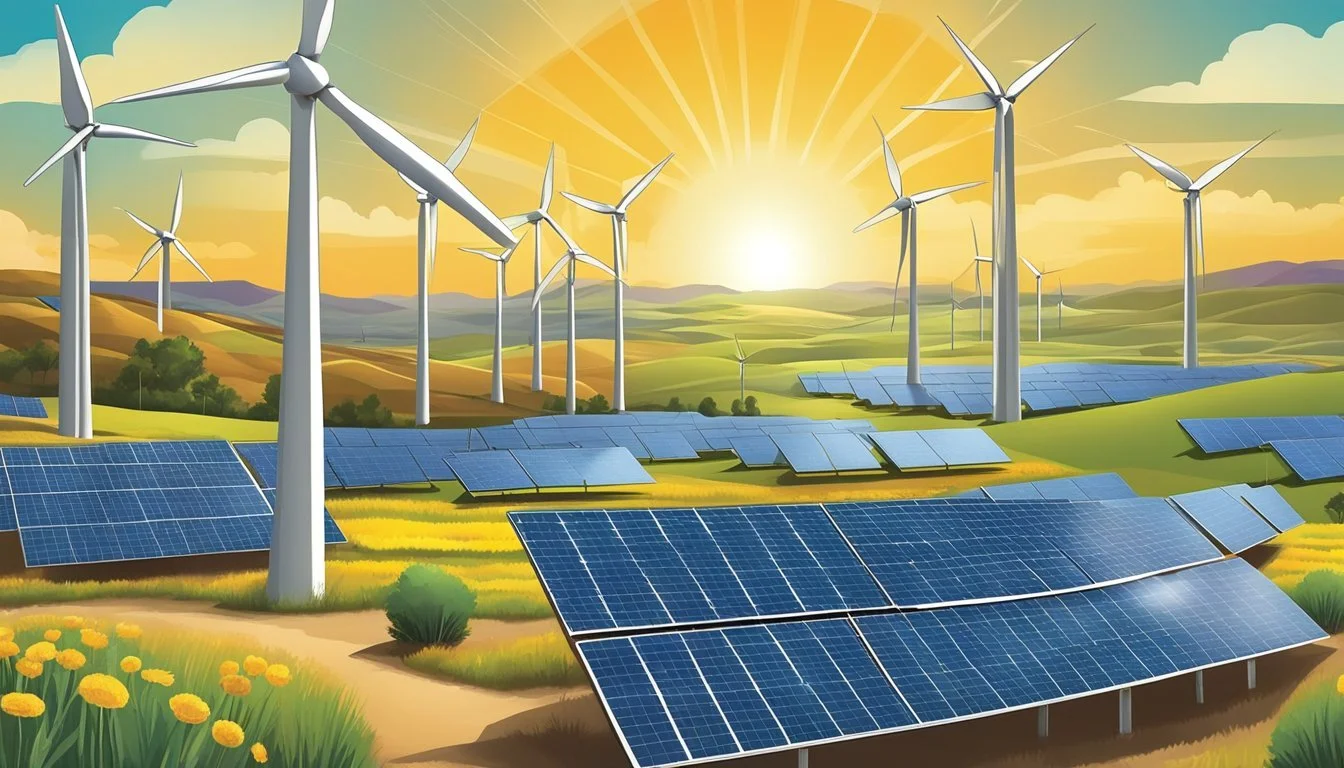Incentives for Renewable Energy and Conservation in Colorado
Advancing Sustainable Practices
Colorado has become a prominent example of how states can lead in the transition toward a more sustainable future, buoyed by myriad clean energy programs. With the dual objectives of reducing greenhouse gas emissions and energy costs, these programs are designed to pave the way for a more resilient and low-carbon economy. Tailored incentives and funding opportunities, such as clean energy grants, are key tools in fostering the adoption of renewable resources and enhancing energy efficiency across the state.
The passage of legislation during the 2021 session provided a significant push for Colorado's clean energy initiatives. This includes measures for climate action and environmental justice, which aim not only to improve the state's environmental footprint but also to ensure that the benefits of clean energy reach all residents. The commitment to this transition is evident in the growing interest in and expansion of renewable energy projects, spurred in part by tax credits and incentives outlined in the Inflation Reduction Act.
Transportation electrification is another focus for Colorado, aiming to reduce emissions from one of the largest contributors to greenhouse gases. The state's initiatives encourage the use of zero-emission vehicles and support the necessary infrastructure, marking a comprehensive approach to energy conservation and sustainability. These efforts demonstrate Colorado's multifaceted strategy in building an energy-efficient future that benefits the environment and its citizens alike.
Colorado's Energy Landscape
Colorado is actively shifting towards a sustainable energy future, focusing on reducing greenhouse gas emissions and embracing renewable energy solutions.
Current Energy Profile
Colorado's energy mix has been evolving, with a notable pivot from traditional fossil fuels to more sustainable sources. They boast a diverse portfolio including wind, solar, biomass, geothermal, and small hydroelectric energy production. A range of financial incentives is available to support this transition, encouraging both individuals and businesses to invest in renewable options.
Climate Action and Renewable Energy Goals
Under the leadership of Governor Polis, Colorado has set ambitious climate action goals, aspiring to achieve 100% renewable energy by 2040. The state’s legislative efforts are geared towards increasing renewable energy tax incentives, thereby reducing costs for electric vehicles, electric bikes, and heat pumps. These measures are part of a comprehensive strategy to cut red tape and guide Colorado towards a greener, more sustainable economy.
Legislation and Incentives
Colorado's commitment to renewable energy and conservation is reflected through various legislative measures and incentives. These efforts are designed to facilitate a transition towards cleaner energy sources and to support individuals and businesses in adopting sustainable practices.
Financial Incentives and Tax Credits
The state has implemented a range of financial incentives and tax credits aimed at promoting the use of renewable energy and advancing energy conservation. Notable is the ambitious legislative package that aims for 100% renewable energy by 2040. To support this, Colorado offers significant incentives such as electric vehicle tax credits, reducing the cost of electric vehicles by $5,000 and electric bikes by $800. Additionally, tax credits are also available for heat pumps, providing savings of between $3,000 and $500.
Furthermore, Colorado extends property tax exemptions for renewable energy systems. This exemption means that residents and businesses investing in renewable energy, like solar panels or wind turbines, won't have to pay additional property taxes on the value that these systems add to their property.
Inflation Reduction Act Relevance
The Inflation Reduction Act, signed into law, has considerable implications for Colorado's energy strategies. It includes measures to lower greenhouse gas emissions by 100% by 2050, aligning with the state's objectives. This federal legislation also enhances local incentives by providing grants and additional tax credits, bolstering state efforts through further financial backing and creating more comprehensive support systems for individuals and organizations choosing sustainable options.
Supporting Renewable Energy Infrastructure
To substantially bolster renewable energy, Colorado is making significant strides in infrastructure investment and grid modernization. Ensuring stability and efficiency in energy systems is a priority.
Investment in Infrastructure
The state benefits from federal funding programs, like those detailed in the Clean Energy Infrastructure Program, which facilitate research and development in renewable energy technologies. Such investments are designed to contour the energy landscape towards sustainability and resilience against electric grid disruptions, focusing on infrastructure that supports the generation and distribution of renewable energy.
Transmission and Grid Upgrades
Critical to the implementation of renewable energy solutions is the upgradation of transmission systems and the electric grid. This includes expanding the capacity to handle increased renewable energy flows while simultaneously enhancing the grid's resilience against interruptions. Colorado prioritizes projects that improve the grid infrastructure, reflected in initiatives that introduce advanced control systems and expand energy storage solutions.
Community-Centric Initiatives
In Colorado, community-centric initiatives for renewable energy and conservation have carved a path for local governments and communities to enhance their energy independence and sustainability. These programs foster public-private partnerships and aim to establish community resilience through improved energy infrastructure.
Programs for Communities
A significant thrust towards community resilience is the focus on creating Community Energy Programs. These initiatives include grants and support for projects that the Colorado Energy Office oversees, designed to reduce greenhouse gas emissions and consumer energy costs. These energy programs cater specifically to communities and local governments, helping to deploy renewable energy and energy efficiency projects. For example, Colorado provides funding opportunities aimed at the public sector, including schools and local governments, to advance clean energy and zero-emission vehicles for the benefit of all Coloradans.
Grants for Local Governments: Colorado offers clean energy grants that enable municipalities to adopt renewable energy solutions and improve local energy systems.
Community Programs: These include various initiatives such as the promotion of transportation electrification and the integration of renewable energy sources into community infrastructures.
Energy Performance Contracting
Energy performance contracting (EPC) presents Colorado communities with an innovative financing method to upgrade their energy infrastructure without upfront costs. Here's how it works:
Energy Savings: Local governments enter into agreements with energy service companies (ESCOs). These companies conduct comprehensive energy audits and implement improvements guaranteed to generate energy savings over time.
Financial Structuring: The costs for upgrades are paid back through the accrued energy savings, allowing local governments to remain financially prudent while enhancing their sustainable practices.
Energy performance contracting empowers Colorado local governments and public entities to achieve significant energy savings, propel their renewable energy efforts, and build microgrids for community resilience without bearing the immediate fiscal burden.
In this framework, both Programs for Communities and Energy Performance Contracting play pivotal roles in advancing Colorado's renewable energy and conservation goals. Through dedicated attention to policies and partnerships that support communities, Colorado is paving the way toward a more sustainable and resilient future.
Renewable Energy Technologies
In Colorado, renewable energy technologies are gaining momentum, with significant strides being made in solar, wind, and geothermal sectors to boost electricity generation.
Solar Energy Expansion
Colorado's commitment to increasing solar energy capacity is exemplified by ambitious legislative efforts. The state aims to achieve 100% renewable energy by 2040 with solar energy being a crucial component. State-wide incentives encourage the installation of solar panels, and provision for excess energy sales to the grid amplifies the benefits for households producing solar electricity.
Wind Energy Developments
Wind power is experiencing substantial growth in Colorado. The state's vast open spaces make it an ideal location for wind farms, contributing significantly to its electricity generation mix. Colorado's investment in wind energy infrastructure has led it to become a leader in wind-powered electricity, enhancing sustainable energy accessibility and job creation in the sector.
Geothermal Energy Utilization
Colorado leverages its unique geological features for geothermal energy production. Utilization of geothermal resources for both residential heating and large-scale energy production demonstrates Colorado's diverse approach to renewable energy technologies. Advances in geothermal technology continue to unlock potential for increased electricity generation and system efficiency.
Improving Energy Efficiency
In Colorado, enhancing energy efficiency stands as a priority with a focus on reducing energy costs and greenhouse gas emissions. Both residential and commercial sectors, as well as the industrial landscape, are targeted for energy-saving incentives and advancements in building system electrification.
Residential and Commercial Incentives
Colorado offers a variety of incentives for homeowners and businesses to improve energy efficiency. Homeowners can reduce energy costs by accessing financial assistance for upgrading appliances to energy-efficient models. Businesses can benefit from rebates for implementing efficiency measures in lighting, HVAC systems, and refrigeration. The Clean Energy Programs provide access to resources promoting energy efficiency across urban and rural communities, leading to significant savings and environmental benefits.
Homes: Upgrades can include insulation, energy-efficient windows, and LED lighting.
Businesses: Custom rebates and grants support the adoption of advanced energy systems.
Industrial Energy Savings
The industrial sector in Colorado can also realize energy savings through several initiatives. The promotion of building system electrification includes transitioning to electric industrial processes that are more efficient and having a smaller carbon footprint than traditional fossil fuel-based systems. Energy costs can be curtailed through strategic investments in energy-efficient machinery and process optimizations, encapsulating the overall commitment to an equitable transition to a low-carbon economy.
Industrial: Enhancements to manufacturing processes, efficient facility design, and the use of energy management systems are key areas of focus.
Sustainable Transportation Solutions
Colorado has recognized the importance of sustainable transportation to meet its conservation and environmental goals. Key efforts are being made in the state to increase the adoption of electric vehicles and upgrade public transit infrastructure, aligning with a clear vision for a cleaner, more sustainable transportation future.
Electric Vehicles Adoption
Colorado is actively promoting the adoption of electric vehicles (EVs) to achieve zero-emission transportation goals. Incentives such as tax credits and grants are available to encourage consumers and businesses to transition away from fossil fuels. The Colorado Department of Transportation acknowledges the significant role of EVs in reducing the consumption of natural resources and protecting the environment for future generations. The state's infrastructure planning includes expanding EV charging networks to further ease the transition and cater to growing demand.
Public Transit Infrastructure
Investing in public transit infrastructure is another cornerstone of Colorado's approach to sustainable transportation. Efforts to modernize and expand public transit options are underway, forging a path to a reduced carbon footprint associated with daily commutes. Colorado has introduced significant legislation, as mentioned on the Governor of Colorado's official website, to establish funding and support mechanisms for enhancing public transportation, which includes initiatives to prioritize energy efficiency and climate goal acceleration.
Environmental and Health Benefits
Colorado's initiatives in renewable energy and conservation are yielding significant environmental and health advantages. Stringent policies and programs aim to improve air quality and bolster public health, while increasing the state's resilience to environmental challenges.
Air Quality Improvement
Renewable energy programs are instrumental in reducing emissions of air pollutants. By transitioning to cleaner energy sources like solar and wind, Colorado reduces its reliance on fossil fuels, thus cutting down the release of harmful substances into the atmosphere. These measures not only contribute to clearer skies but also help in the significant reduction of greenhouse gases, which is a cornerstone of Colorado's approach to improving air quality.
Health Impact of Clean Energy
The shift towards clean energy aligns with enhanced public health outcomes. Communities across Colorado experience fewer health issues when the air is cleaner, reducing the incidents of respiratory problems and other pollution-related ailments. Furthermore, by fostering a clean energy economy, the state not only advances its commitment to environmental stewardship but also supports health benefits that span across urban and rural areas, ensuring that all Coloradans have the opportunity to live in a healthier environment.
Education and Workforce Development
Colorado's commitment to renewable energy is shaping its educational landscape and job market. The state endorses programs to educate its citizens on renewable technologies while simultaneously fostering job growth in the sector.
Energy Education Initiatives
Colorado boasts several initiatives aimed at strengthening energy education among its populace. Programs like the REpowering Schools initiative collaborate with educators and industry experts to integrate renewable energy topics into school curriculums. Additionally, the state's energy office offers resources to help Coloradans understand the benefits of clean energy transitions for health, environmental protection, and economic growth.
Primary and Secondary Schools: These programs engage young students with innovative curriculums which may include hands-on renewable energy projects.
Higher Education: Courses and degrees related specifically to clean energy are increasingly prominent in Colorado's academic institutions, preparing students for future work in the sector.
Renewable Energy Job Creation
Colorado is actively working to expand its clean energy workforce. The state's Electrification and Energy grant, for example, includes funding for Zero Emission Vehicle (ZEV) Workforce Development. This grant focuses on attracting and developing the necessary skills to meet the demands of the growing transportation electrification sector.
Skills Development: Training programs aim to equip individuals with the technical skills required for renewable energy jobs.
Employment Opportunities: Demand for qualified professionals in wind energy, solar, and electrification increases as the state invests in renewable infrastructure advancements.
Optimizing Public Sector Engagement
In Colorado, the alignment of energy policies with governmental initiatives has been crucial in driving the state toward a more sustainable future. Engaging public sector entities through legislative reforms and active roles in energy policy has proven effective in optimizing energy consumption and increasing renewable energy use in public buildings.
Public Building Reforms
Colorado's energy landscape has seen a transformative shift, particularly in the arena of public building reforms. The state's public buildings are increasingly being targeted for energy efficiency upgrades and renewable energy integration. The Public Building Electrification Program represents a significant push towards reducing carbon footprints by encouraging the adoption of zero-emission energy systems. These reforms not only reduce operational costs but also set a precedent for environmental responsibility.
Electrification Program Initiatives:
Installation of advanced energy metering
Upgrades to more efficient lighting and HVAC systems
Incorporation of renewable energy sources
Colorado Energy Office, playing a pivotal role in these reforms, emphasizes the importance of grants and funding opportunities. These incentives support public sector efforts towards the adoption of clean energy solutions, underscoring the state's commitment to slashing greenhouse gas emissions.
Energy Policy and Government Role
It's essential to recognize government involvement in shaping energy policies which directly influence public sector sustainability practices. The Colorado Oil and Gas Conservation Commission is instrumental in balancing energy needs against environmental protection. Their oversight ensures responsible energy development, which aligns with statewide goals for energy conservation and renewable energy implementation.
Government Energy Policy Focus Areas:
Environmental protection during energy extraction
Support for transition to renewable energy
Advocacy for energy efficiency across public sectors
Through concerted efforts, governments, led by agencies like the Colorado Energy Office, are creating a robust framework for renewable energy adoption and conservation, steering public buildings, and by extension, the public sector towards greener futures.
Private Sector and Manufacturing
In Colorado, the private sector is actively engaging in funding initiatives that bolster clean energy development. These investments are crucial to expanding the manufacturing of clean technologies within the state.
Private Investments in Clean Energy
Private entities in Colorado have recognized the importance of investing in clean energy, as exemplified by the Colorado C-PACE program. This initiative has successfully facilitated over $250 million in private investment, funding more than 120 projects and thus significantly bolstering the state's clean energy improvements. These investments have spread across 39 counties, demonstrating comprehensive private sector commitment.
Manufacturing and Clean Tech
The manufacturing industry in Colorado is transitioning towards clean technologies, aligning with state-wide goals for energy conservation and emissions reduction. The Colorado Energy Office plays a pivotal role in this shift, supporting the mission to mitigate greenhouse gas emissions through the advancement of energy efficiency and clean energy technologies in manufacturing. This further reflects the intertwined relationship between the private sector, governmental initiatives, and the manufacturing landscape in Colorado, driving toward a more sustainable future.
Fostering Zero-Emission Goals
Colorado is committed to reducing greenhouse gas emissions and fostering a sustainable energy future. This commitment involves setting ambitious targets and implementing policies meant to achieve zero-emission status, alongside receiving recognition for these efforts.
Pathway to Zero-Emission
Colorado's initiatives are structured around specific targets aimed at reducing greenhouse gas emissions and achieving a zero-emission future. The state has set a science-based climate target to reduce emissions by 26% by 2025, 50% by 2030, and 90% by 2050 from 2005 levels. The roadmap to reach these targets includes transitioning to renewable energy sources, improving energy efficiency across all sectors, and investing in zero-emission transportation options. The ultimate goal to attain 100% renewable energy by 2040 is one of the most significant milestones on this path.
Clean Energy Awards and Recognitions
In its quest for clean energy transition, Colorado has been recognized for its pioneering policies and accomplishments. Excelling in reducing GHG pollution from buildings has garnered the state nation-leading status in clean energy. These awards and recognitions serve as a testament to Colorado's commitment to a zero-emission future and underscore the progress made towards their 100% renewable energy goal. The recognitions also bolster the state's reputation and encourage further innovation and development in renewable energy and conservation efforts.
Contact and Resources
In this section, you'll find how to connect with energy specialists and where to access materials on renewable energy initiatives in Colorado.
Getting in Touch with Energy Experts
For those seeking guidance on renewable energy projects and energy efficiency improvements, the Division of Local Government offers comprehensive support. They can be reached via their official website, offering assistance on various financial incentives and funding opportunities for green initiatives.
The Colorado Energy Office plays a pivotal role in facilitating the adoption of clean energy, and they are another valuable point of contact. They provide information about programs aimed at reducing energy costs, promoting clean energy, and supporting zero emission vehicle deployment to benefit all in Colorado.
Access to Renewable Energy Resources
Colorado residents interested in solar programs and energy efficiency rebates can utilize the resources provided by the Clean Energy Financing program. It offers details on financing options that help reduce greenhouse gas emissions and consumer energy costs.
For those exploring grants and funding to advance clean energy initiatives, further information is available on the Clean Energy Grants platform. This portal highlights newly authorized funding suitable for a variety of clean energy projects.











